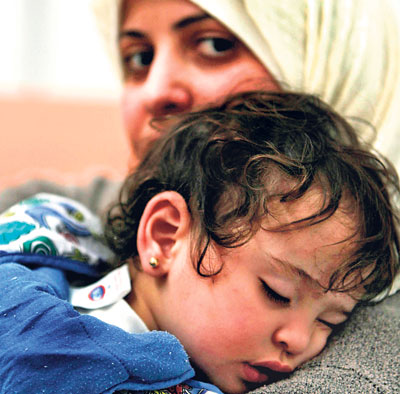
Iraqi refugees overwhelm UN centre in Syria
DAMASCUS, May 11, 2007 (AFP) - They know they may have to wait for a long time, maybe even months. But still they come, and their numbers are increasing by the day. The never-ending flow of refugees fleeing to Syria from the endless violence in neighbouring Iraq is overwhelming the UN relief centre. "With such a growing flow (of refugees), we have boosted our operations,"Sybella Wilkes of the United Nations High Commissioner for Refugees told AFP at the UNHCR centre in the Damascus suburb of Duma. "It's a real human tragedy." She said the centre registered 33,000 refugees between January and mid-April this year alone -- the same number it helped between 1991 after the first Gulf War and 2006. The UNHCR says that aid requirements are skyrocketing, with up to 50,000 Iraqis fleeing the violence in their country every month. Syria hosts the largest number of Iraqi refugees in the region, an estimated 1.2 million people, according to UNHCR figures. Refugees at Duma who spoke to AFP did so on condition that their real names not be used, because they feared retaliation against family members still living in Iraq. "My wife had a heart attack, and I could not buy her medicines. We hope that the UNHCR will do something for us," said Wadih. The businessman complained that they left behind everything they owned before fleeing to Syria to escape the violence that has plagued Iraq since the 2003 US-led military invasion that ousted the Saddam Hussein regime. "How long is this going to last?" wondered Ali, a Shiite Muslim married to a Sunni, before being interrupted by a loudspeaker announcement that his ticket number for an interview was being called. After being interviewed by UNHCR officials and having personal details entered on to a computer, each refugee receives a certificate that allows him or her to benefit from the world agency's assistance, including food, medical help and psychological treatment. At the UNHCR centre in Duma, 24 employees register the names and other details of refugees who are part of the world's largest exodus this century. "We interview an average of 250 people every day, while there are about 2,000 who wait in line in order to be interviewed," said the UNHCR's Trine Korvig, a supervisor. Many refugees are forced to live in small overcrowded flats on the outskirts of Damascus while they await their turn, a process which can take up to seven months. The UNHCR operates a mobile clinic and also has a gynaecologist and a midwife. It plans to build a hospital and expand existing facilities in order to treat patients who suffer from chronic diseases or traumatic psychological disorders, in addition to constructing three schools and refurbishing several more. "We are using the 15 million dollars allocated to projects in Syria out of the 60 million dollars decided at the international conference" last month in Geneva to help Iraqi refugees, Korvig said. Tareq, 26, a refugee bound to a wheelchair since being wounded in a double suicide bombing in Baghdad last December, said he went to Syria in the hope of receiving medical treatment. "It doesn't matter that you sometimes have to wait for up to seven months before getting an interview, or that you have to live crammed together with others in a small flat," he said. Samir, a former factory worker, waited at the centre with his pregnant wife and one-year-old daughter. "We fled from the bombings, the kidnappings and checkpoints everywhere," he said. "It was very risky just going to work. So we decided to come to Syria, especially since my wife is pregnant."Noura, a 30-year-old wearing elegant clothes and in full make-up, said she used to earn a decent living working as an executive secretary in Baghdad. Today she sits on the pavement outside the UNHCR centre in Duma with her husband, two children and her mother -- a family forced into exile. "We don't have any other choice," she said. Her mother Selimeh added bitterly: "We have a saying that he who leaves his home loses respect."The UNHCR and the Syrian Red Crescent have set up a special area for the many children who accompany their parents to the centre, so they can play while their fathers and mothers wait to be interviewed. "I want to go back home. We are all sad," said one five-year-old boy.
Another boy of similar age played with a toy he had made out of plastic building bricks. It resembled a Kalashnikov assault rifle. "This is what the violence does to our children," his mother said ruefully. |
|| Front
Page | News | Editorial | Columns | Sports | Plus | Financial
Times | International | Mirror | TV
Times | Funday
Times || |
| |
Copyright
2007 Wijeya
Newspapers Ltd.Colombo. Sri Lanka. |
